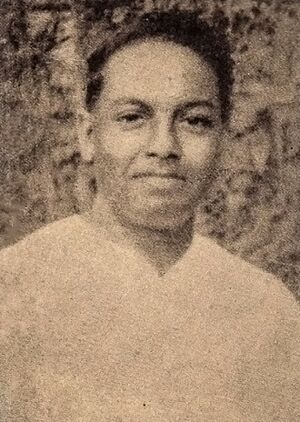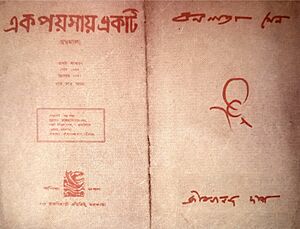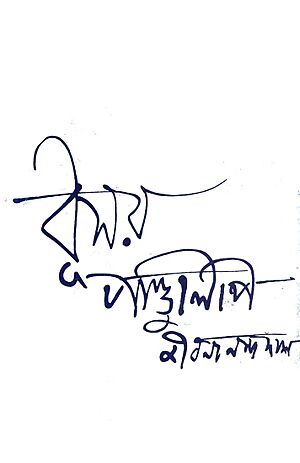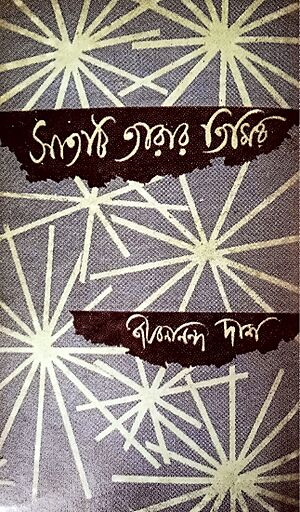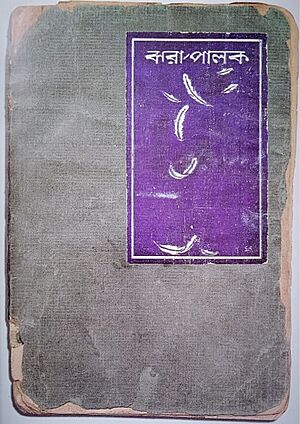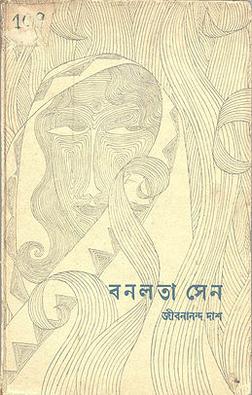Jibanananda Das facts for kids
Quick facts for kids
Jibanananda Das
|
|
|---|---|
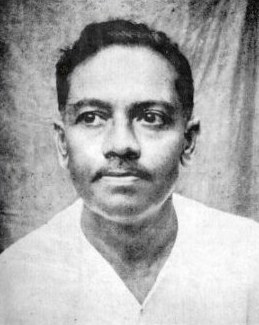
Portrait of Jibanananda Das
|
|
| Born | Jibanananda Das 17 February 1899 Bakerganj, Bengal, British India (now Barisal, Bangladesh) |
| Died | 22 October 1954 (aged 55) Calcutta, West Bengal, India |
| Occupation | Poet, writer, and professor |
| Language | Bengali |
| Nationality | British Indian (1899–1947) Indian (1947–1954) |
| Alma mater | Brajamohan College University of Calcutta |
| Genre | Poetry, novels, short stories, criticism |
| Literary movement | Bengali Modernism |
| Notable works | Banalata Sen, Rupasi Bangla, Akashlina, Banalata Sen, Campe, Bodh |
| Notable awards | Nikhil Banga Rabindra Sahitya Sammelan Award (1952) Sahitya Akademi Award (1955) |
| Spouse | Labanyaprabha Das (née Gupta) |
| Children | 2 |
| Relatives | Kusumkumari Das (mother) |
| Signature | |
 |
|
Jibanananda Das (17 February 1899 – 22 October 1954) was an Indian poet, writer, and professor who wrote in the Bengali language. People often called him "Rupashi Banglar Kabi," which means 'Poet of Beautiful Bengal.' He is one of the most widely read poets in Bangladesh and West Bengal, after Rabindranath Tagore and Kazi Nazrul Islam.
During his lifetime, Jibanananda Das was not very famous. However, today he is known as one of the greatest poets in the Bengali language. He was born in Barisal and studied English literature at Presidency College, Kolkata and Calcutta University. He faced many challenges in his career and often struggled with money. He taught at several colleges but never had a permanent job. After India was divided in 1947, he moved to Kolkata.
Jibanananda Das died on 22 October 1954, eight days after a tramcar hit him. Witnesses said he did not stop when the tram whistled. He was a very private person and did not publish most of his writings while he was alive. Only seven books of his poems were published then. After he passed away, people found out he had written 21 novels and 108 short stories! Some of his famous works include Ruposhi Bangla and Banalata Sen.
Contents
Jibanananda Das: A Poet's Journey
Jibanananda Das's life was full of learning and writing. He started writing poems early on, and his unique style later became very important in Bengali poetry.
Early Life and Education
Jibanananda Das was born in 1899 in Barisal, a small town. His family had moved there from another area called Bikrampur. His grandfather, Sarbānanda Dāśagupta, was important in the Brahmo Samaj movement, which focused on social reform. He changed the family name to Das.
Jibanananda's father, Satyānanda Dāś, was a school teacher and writer. He also started a magazine called Brôhmobadi. His mother, Kusumakumārī Dāś, was also a poet. She wrote a famous poem called Adôrsho Chhēlē ("The Ideal Boy").
Jibanananda was the oldest child and was called Milu. He had a younger brother, Aśōkānanda, and a sister, Sucharita. When he was eight, he started school at Brojomohon School. His father believed children should start school a bit later, so his mother taught him at home first.
In 1915, he finished his high school exams with excellent grades from Brajamohan College. Two years later, he passed his intermediate exams. He then moved to University of Calcutta for higher studies.
Life in Calcutta: Early Days
Jibanananda went to Presidency College, Kolkata to study English literature. He earned his first degree in 1919. That same year, his very first poem, Borsho-abahon (Arrival of the New Year), was published in Brahmobadi journal.
In 1921, he completed his master's degree in English from University of Calcutta. He also started studying law but later stopped. The next year, he began teaching English at City College, Calcutta.
Travels and Challenges
His writing career began to grow. In 1925, he wrote a poem about the death of Chittaranjan Das, a famous leader. This poem was later included in his first book, Jhara Palok (Fallen Feathers), published in 1927. Other poets praised his work, thinking it was written by a very experienced poet.
However, Jibanananda faced difficulties. He lost his job at City College in 1927. He was the youngest teacher, so he was the first to be let go when student numbers dropped. Some critics also wrote harsh reviews about his poetry.
With no job in Calcutta, he moved to Bagerhat to teach at Bagerhat P. C. College. But he returned to Calcutta after only three months, struggling financially. He gave private lessons to make money. In 1929, he took a teaching job in Delhi at Ramjas College, but this also lasted only a few months.
In May 1930, he married Labanyaprabha Sen. Their daughter, Manjusree, was born the next year. During this time, he wrote many secret novels and short stories, which were not found until after his death. In 1934, he wrote a series of poems that would later become the famous collection Rupasi Bangla.
Back in Barisal and Growing Fame
In 1935, Jibanananda returned to his old college, Brajamohan College, in Barisal as an English lecturer. Around this time, a new poetry magazine called Kobita was started by Buddhadeb Bose. Jibanananda's poem Mrittu'r Aagey (Before Death) appeared in the first issue. Rabindranath Tagore himself praised this poem.
In the second issue of Kobita, Jibanananda published his most famous poem, "Banalata Sen." This short, 18-line poem is now one of the most well-known poems in the Bengali language.
His second book of poetry, Dhusar Pandulipi, was published the next year. His son, Samarananda, was born in 1936. Jibanananda's influence in Bengali literature continued to grow. In 1938, Tagore included an edited version of Jibanananda's poem Mrityu'r Aagey in his poetry collection.
In 1942, his third poetry book, Banalata Sen, was published. The Second World War deeply affected his writing.
Life in Calcutta: Final Years
After the war, there was a strong push for India's independence. This led to the division of India, and Bengal was split into two parts. Jibanananda had always believed in people living together peacefully. He even wrote a poem called Hindu Musalman in his first book. However, real life was different, and he saw terrible violence during the communal riots of 1946-47.
Just before India was divided in August 1947, Jibanananda left his job at Brajamohan College and said goodbye to Barisal. He and his family became part of the huge migration of people. He worked for a magazine for a short time but was fired.
In 1948, he finished two novels, Mallyaban and Shutirtho, which were not found until after his death. His fifth poetry book, Shaat'ti Tarar Timir (Darkness of Seven Stars), was published in December 1948. His mother also passed away that same month.
By this time, he was well-known in Calcutta's literary world. He continued to face job losses, being fired from Kharagpur College in 1951 and Barisha College in 1952. He eventually became the head of the English department at Howrah Girl's College.
In his last year, Jibanananda was recognized as one of the best poets after Tagore. He was often invited to literary events and poetry readings. In May 1954, his book Best Poems (Sreshttho Kobita) was published. This book won the Indian Sahitya Akademi Award in 1955, after his death.
Family Life
Jibanananda married Labanyaprabha Sen in 1930. They had a daughter named Manjusree and a son named Samarananda.
His Passing
Jibanananda’s life ended suddenly in a road accident when he was 55. On 14 October 1954, he was hit by a tram while crossing a road in Calcutta. He was returning home from his evening walk. He was badly hurt and taken to the hospital. Even a former chief minister, Dr. Bidhan Chandra Roy, visited him. But his injuries were too severe. Jibanananda died in the hospital on 22 October 1954. He left behind his wife, son, and daughter.
His death was a great loss to the literary world. Many newspapers published tributes to his poetry. The Times of India wrote that he made a big contribution to modern Bengali poetry with his unique style.
Jibanananda's Impact on Bengali Poetry
Jibanananda Das played a huge role in shaping modern Bengali poetry. He created a new style that was different from the famous poets before him.
Influence of Rabindranath Tagore
Bengali is spoken by over 300 million people today. Bengali poetry grew greatly thanks to poets like Michael Madhusudan Dutt and Rabindranath Tagore. Tagore was especially powerful in Bengali literature for about 50 years, influencing almost every poet. When Tagore won the Nobel Prize in Literature in 1913 for his book Gitanjali, Bengali literature gained international attention.
Modern Poets in Bengal
In Bengal, poets started trying to create new styles of poetry that were different from Tagore's. Kazi Nazrul Islam became very popular with his patriotic poems. Other poets, like Sudhindranath Dutta, Buddhadeb Bose, Amiya Chakravarty, Jibanananda Das, and Bishnu Dey, helped bring a new style called modernism to Bengali poetry. These five poets were pioneers in creating a new kind of poetry in the 20th century.
However, Jibanananda Das was not well understood during his lifetime. Many people, including critics, found his poems hard to understand. They even pointed out what they thought were mistakes in his writing style. Even Tagore, who praised his talent, made some unkind comments about his word choices. But Jibanananda's unique style would eventually make him famous.
How His Popularity Grew
In the second half of the 20th century, Jibanananda Das became one of the most popular poets in modern Bengali literature. His special way of writing, his choice of words, and his themes were new and took time for readers to appreciate. But by the end of the 20th century, Jibanananda's poetry became a key part of modernism in Bengali poetry.
While his early poems showed some influence from Kazi Nazrul Islam, Jibanananda soon developed his own unique poetic voice. Buddhadeb Bose was one of the first to see how special his style was. As Jibanananda's writing became more mature, his messages sometimes seemed hidden. Readers and critics wondered if his poems were too difficult to read.
It was only after his accidental death in 1954 that more readers began to understand and enjoy Jibanananda's poetry. By the time his 100th birthday was celebrated in 1999, Jibanananda Das was the most popular and widely read poet in Bengali literature. Even as new styles of poetry emerged, Jibanananda's work remained important. This is because his poetry changed over time and included elements that fit with newer ideas.
Jibanananda's Poetic Style
Jibanananda Das started writing and publishing in his early 20s. During his life, he published 269 poems, with 162 collected in seven books. Many more poems, novels, and short stories were found and published after he died. By 2008, nearly 800 of his poems were known.
Some experts call Jibanananda Das "Bengal's most cherished poet since Rabindranath Tagore." His poetry can sometimes feel like a puzzle, with deep feelings shown through unusual images. The connections between lines might not always be clear. He broke away from traditional poetry structures, making his poems flow in a unique way that needs careful reading.
For example, in his poem Night, he writes about Calcutta:
Lepers open the hydrant and lap some water.
Or maybe that hydrant was already broken.
Now at midnight they descend upon the city in droves,
Scattering sloshing petrol. Though ever careful,
Someone seems to have taken a serious spill in the water.
Three rickshaws trot off, fading into the last gaslight.
I turn off, leave Phear Lane, defiantly
Walk for miles, stop beside a wall
On Bentinck Street, at Territti Bazar,
There in the air dry as roasted peanuts.
Jibanananda's style often seems to come naturally. It has long sentences, unexpected word combinations, and mixes different types of language. This creates a unique feeling for the reader.
One of his most famous lines, from the collection Shaat-ti Tarar Timir ("The Blackness of Seven Stars"), shows his love for his homeland: বাংলার মুখ আমি দেখিয়াছি, তাই আমি পৃথিবীর রূপ খুঁজিতে যাই না আর... This means: "I have seen the face of Bengal, so I no longer seek the beauty of the world..."
Jibanananda successfully blended Bengali poetry with the international modernist movement of the early 20th century. He was both a "classicist" and a "romantic," creating a new and appealing world in his poems. He often wrote about ancient times and places, showing a strong sense of history. Yet, he always stayed connected to Bengal's nature and beauty.
In his poem Banalata Sen, he writes:
For thousands of years I roamed the paths of this earth,
From waters round Ceylon in dead of night
to Malayan seas.
Much have I wandered. I was there
in the grey world of Asoka
And Bimbisara, pressed on through darkness
to the city of Vidarbha.
I am a weary heart surrounded by life's frothy ocean.
To me she gave a moment's peace –
Banalata Sen from Natore.
Jibanananda was amazed by how humans continue to exist even as time constantly changes. He felt that people are trapped by life's difficulties. He believed the world was old and strange, and that humanity had been "wanderers of this world" for too long to find anything new.
He was a private person and took his time with his writing. He once wrote:
I do not want to go anywhere so fast.
Whatever my life wants I have time to reach
there walking
Jibanananda was also known as a "surrealist poet" because his poems often showed a wild flow of thoughts from his subconscious mind.
Prose Style
During his lifetime, Jibanananda was mainly known as a poet. But after his death, many novels and short stories were found. His stories often reflected his own life experiences. While his poems were more hidden, his fiction allowed his personal life to show through. His prose style was unique, using complex sentences and unusual words. His essays were dense but could express deep ideas in a short space.
Major Works
Jibanananda Das wrote many poems, novels, and short stories. Here are some of his most important works:
Poetry Collections
- Jhôra Palok (Fallen Feathers), 1927
- Dhusar Pandulipi (Grey Manuscript), 1936
- Banalata Sen, 1942
- Môhaprithibi (Great Universe), 1944
- Shaat-ti Tarar Timir (Darkness of Seven Stars), 1948
- Shreshtho Kobita (Best Poems), 1954
- Ruposhi Bangla (Bengal, the Beautiful), written in 1934, published after his death in 1957
Novels
- Mallyabaan, 1973 (published after his death)
- Sutirtha (published after his death)
- Many others, including Bashmatir Upakhyan, Bibhav, Biraaj, Chaarjon, Kalyani, Mrinal, Purnima.
Short Stories
He wrote over a hundred short stories, including:
- Jamrultola (which inspired a film)
- Aekgheye Jibon
- Bibahito Jibon
- Jadur Desh
- Prithibita Sishuder Noy
Tributes and Legacy
Many famous writers and critics have praised Jibanananda Das's work.
- Binoy Majumdar said, "After Rabindranath, Jibanananda created a new kind of modern poetry in Bengali. He brought a completely new language."
- Buddhadeb Bhattacharjee stated, "In the Post-Tagore era, Jibanananda was the most successful in creating a unique style of poetry."
- Joy Goswami noted, "Whenever I started reading Jibanananda, I found known poems in a new light."
- Malay Roy Choudhury believed, "Postmodernism in Bengali poetry started with Jibanananda Das's poem Paradigm."
His sister, Sucharita Das, said about him: "There were so many myths regarding my elder brother. He escaped from life. He could not tolerate human company. He was solitary. Away from all hustle-bustle... maybe most of them have already proved wrong."
Awards in His Name
The Kolkata Poetry Confluence has created the Jibanananda Das Award for poetry translation. This award recognizes translations of poetry into different languages.
Also, a literary award called Jibanananda Puroshkar, or Jibanananda Prize, is given out in Bangladesh. It honors the best poetry and prose written by Bangladeshi authors each year.
Images for kids
 | Victor J. Glover |
 | Yvonne Cagle |
 | Jeanette Epps |
 | Bernard A. Harris Jr. |


